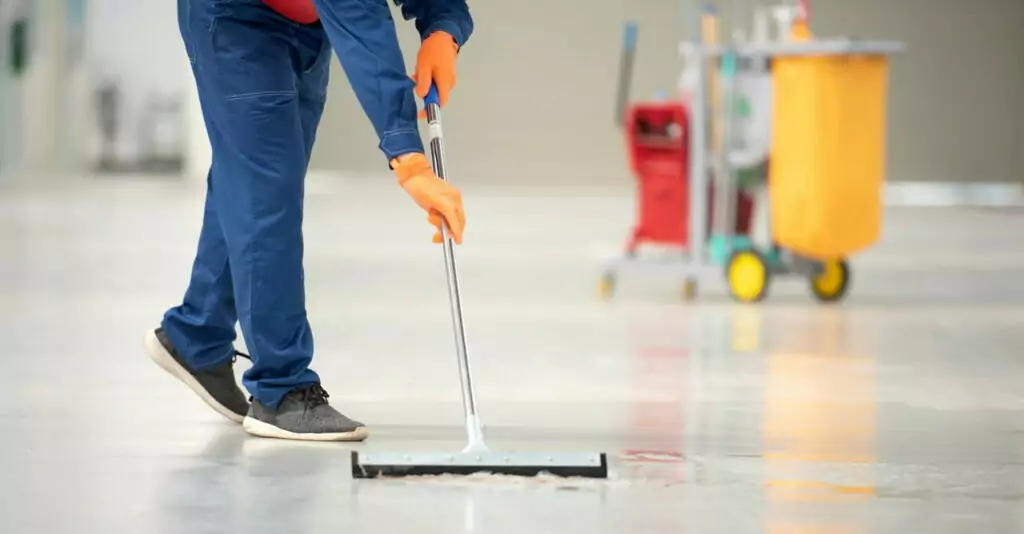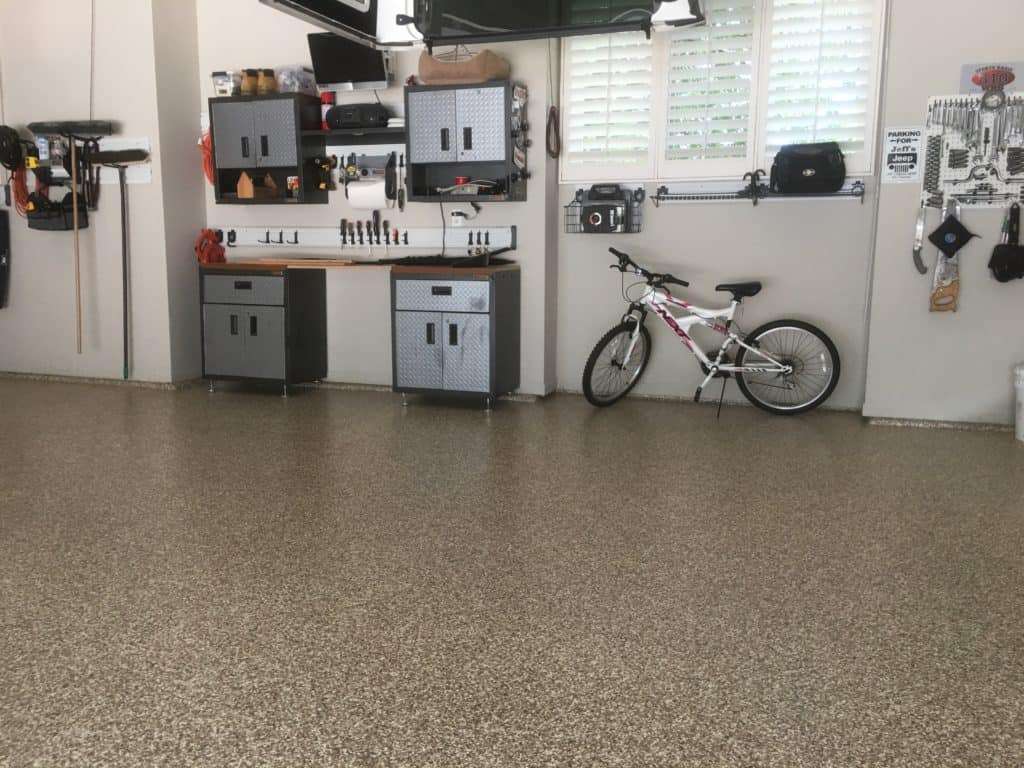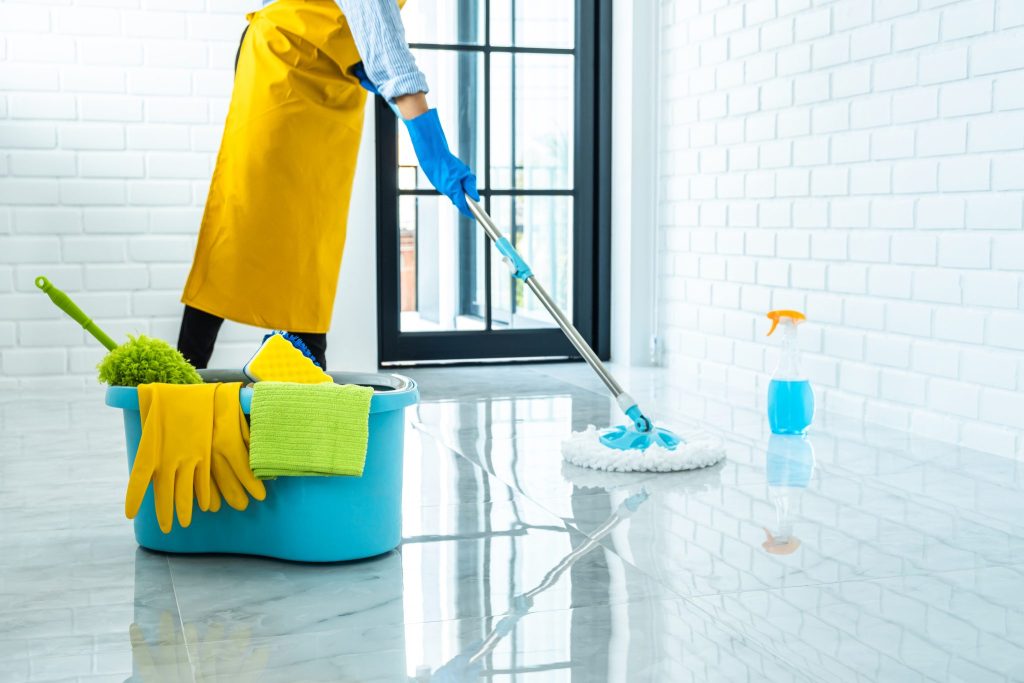Epoxy floors, whether in a residential garage or a bustling commercial space, offer durability, a sleek finish, and minimal upkeep. Cleaning epoxy floors and maintenance are essential, to get the best out of them.
If you’ve invested in epoxy flooring for your garage, driveway, or commercial premises on the Sunshine Coast, proper care will extend its lifespan and keep it looking fresh for years.
This article offers practical, no-nonsense advice on cleaning epoxy floors and maintaining them to the highest standard.
Table of Contents:
- Cleaning Epoxy Floors Regularly to Preserve the Shine
- Immediate Stain Removal is Key
- Protect High Traffic Areas
- Routine Inspections Prevent Long-Term Damage
- Deep Cleaning for Long Term Protection
1. Cleaning Epoxy Floors Regularly to Preserve the Shine
Cleaning epoxy floors should be a routine task. Start by sweeping away dust and debris with a soft-bristle broom or a dust mop. Dirt, grit, and small particles can wear down the surface, making it appear dull over time.
Avoid harsh scrubbing brushes or rough cleaning pads, as these can scratch the epoxy coating. For garage and driveway epoxy floors, we recommend vacuuming regularly, especially if the area experiences high foot traffic or vehicle movement.
For deeper cleaning, use a mild detergent mixed with warm water. Gentle floor cleaners without harsh chemicals will help retain the finish without stripping the protective layer of the epoxy. Avoid using cleaners that contain citrus or vinegar, as they can dull the surface or cause it to lose its shine.
2. Immediate Stain Removal is Key
Spills and stains are inevitable, but timely clean-up can prevent permanent damage. Oil stains in garages, rust on driveways, or paint splatters can penetrate the surface if left untreated.
As soon as a spill occurs, wipe it up with a soft cloth and soapy water. For tougher stains, a soft nylon brush may be used, but always ensure you clean gently to avoid scratching the epoxy.
Acids and solvents should be avoided at all costs, especially for commercial epoxy floors, which may be exposed to chemicals in industries such as automotive or manufacturing. For garages or concrete coatings, consider sealing around potential spill areas to protect against liquid damage.
3. Protect High Traffic Areas
Heavy foot traffic, machinery, and the movement of vehicles can wear down epoxy surfaces faster. In garages, sheds or commercial spaces, using protective mats or rugs at entrances can help. These mats catch dirt, water, and other debris before they get tracked across the floor. For areas where machinery or tools are used, consider placing rubber pads to avoid chipping or dents.
Furniture, such as in a garage gym or a commercial office space, should always have felt pads underneath to prevent scratches when moved. For large, heavy objects, it’s best to lift them rather than drag them across the floor.
4. Routine Inspections Prevent Long Term Damage
To ensure your epoxy floors stay in excellent condition, perform routine inspections. Look for cracks, bubbling, or areas where the epoxy might be lifting. While these issues may seem minor at first, if left unchecked, they can grow into significant problems that are more expensive to fix.
Small cracks or imperfections should be addressed immediately with professional help to prevent them from spreading. Our team offers services such as epoxy floor repairs and resealing, ensuring your floor’s longevity.
5. Deep Cleaning for Long-Term Protection
Over time, dirt can build up in corners or along the edges of the floor. We recommend scheduling a deep clean every six months to a year, depending on the level of use. Deep cleaning involves using specialised epoxy-safe products that lift out ingrained dirt and restore the floor’s shine.
If you’re dealing with large surface areas, such as commercial epoxy flooring, hiring professionals for deep cleaning can save time and guarantee effective results. We use industry-grade cleaning solutions tailored for epoxy, ensuring thorough yet safe cleaning without damaging the surface.
Why Choose Our Epoxy Flooring Services:
- Experience and Expertise: Our team has years of experience servicing both residential and commercial epoxy floors on the Sunshine Coast.
- Tailored Services: From garage epoxy flooring to large commercial spaces, we customise our services to meet your specific needs.
- Premium Materials: We use high-quality epoxy products, ensuring your floor is durable, resistant, and aesthetically pleasing.
- Comprehensive Solutions: Whether you need a new installation, resurfacing, or maintenance, we offer a full suite of services to keep your floors in top condition.
- Customer Satisfaction: Our focus is on delivering a hassle-free experience, with clear communication and professional results every time.
If you want your epoxy floors to last, trust the experts. Contact our team of professionals today for more information or to request a free quote. We’re here to help, whether you need regular maintenance or a complete flooring overhaul.
FAQs
- How often should I clean my epoxy floors?
For residential spaces like garages, sweeping once a week is sufficient. In high traffic commercial areas, you may need to clean daily or several times a week. - Can I use bleach to clean epoxy floors?
No. Bleach is too harsh for epoxy surfaces and can cause discolouration or damage. Stick to mild, non-abrasive cleaners. - What should I do if my epoxy floor gets scratched?
Minor scratches can often be buffed out, but for deeper scratches, it’s best to contact a professional. We offer epoxy repair services to restore your floor to its original condition. - What type of mop should I use for epoxy floors?
Use a soft mop, such as a microfibre mop, which will clean the surface without scratching or dulling the shine of the epoxy. - Can I park my car on an epoxy garage floor?
Yes, epoxy floors are designed to handle the weight of vehicles. However, it’s good practice to clean any oil or chemical spills immediately. - Are epoxy floors slippery when wet?
Epoxy floors can become slippery when wet, especially if they have a high-gloss finish. Adding slip-resistant coatings can help in areas prone to water exposure. - How long do epoxy floors last with proper maintenance?
With proper care and regular maintenance, epoxy floors can last up to 10-20 years, even in commercial settings.






